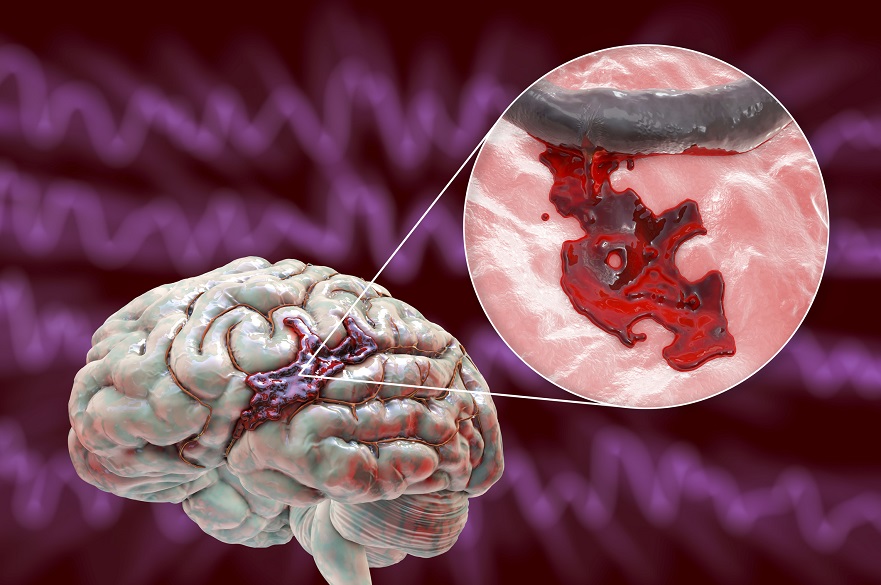Study could reduce risk of brain damage, disability and death following brain haemorrhage
Scientists are developing a novel method for treating brain haemorrhages which it is hoped could reduce the risk of brain damage and disability and increase patients’ chances of survival.
By Dave Rogers | Published on 28 March 2022
Categories: Press office; Research; School of Science and Technology;

Brain haemorrhages, or haemorrhagic strokes, occur when blood leaks from a blood vessel in or around the brain and in the UK accounts for about 15% of all strokes.
The reaction of the brain to the sudden presence of excess blood can lead to brain damage, disability and death – with almost a half of patients going on to die within a month as a result of suffering a brain haemorrhage.
Researchers at Nottingham Trent University are leading the work in collaboration with the University of Manchester, which aims to find a way to prevent the damage to brain cells caused by iron from the blood that builds up in the brain after a haemorrhage.
The researchers – funded by Brain Research UK – are focusing on drugs called ‘iron chelators’, which bind to iron to prevent its accumulation in the body.
They will package these iron chelator drugs into bubbles (‘liposomes’) which can be used to more effectively deliver drugs into the body.
It can be challenging to target drugs to affected areas of the brain due to the ‘blood brain barrier’, which works to prevent potentially harmful toxins in the body from reaching it.
But the team hopes its novel approach will enable the drug to stay in the blood stream for a longer period of time and allow enough drug to get to the area of the brain that contains the bleeding, while also not exposing the rest of the body to unnecessary side effects.
The work, which will involve the use of mice and patient samples, will take about three years.
The study involves a multidisciplinary team of scientists led by Nottingham Trent University’s Dr Zahraa Al-Ahmady in collaboration with Prof Stuart Allan, Dr Adrian-Parry Jones and Dr Ben Dickie at the University of Manchester and NTU’s Prof Sergio Rutella and Prof Graham Ball.
“Unfortunately, no specific medications currently exist to prevent or treat brain haemorrhage,” said lead researcher Dr Zahraa Al-Ahmady, a scientist in Nottingham Trent University’s School of Science and Technology.
She said: “There are severe issues related to having this blood and iron accumulation in the brain, which contributes to the death of brain cells. We hope our approach will prevent this excess iron from damaging neurons and other tissue and be a new approach to blocking blood induced brain damage after bleeding.
“Many of those who suffer a brain haemorrhage will sadly die and those who survive can have permanent disabilities and so the creation of new drugs is essential. We are aiming to find a way to enable treatment to better infiltrate the brain and to remain at the disease site for longer before more serious damage occurs.”
Professor Stuart Allan of the University of Manchester said: “It is exciting to be working in partnership with researchers at Nottingham Trent University on this project. The death rates due to brain haemorrhage have not changed for several decades. This sort of research is therefore vital to find the new treatments necessary to improve survival.”
Caroline Blakely, Chief Executive of Brain Research UK, said: We’re excited to be funding this important work by Dr Al-Ahmady and collaborators, and hope that it will prove to be an important step towards improving outcomes for patients who have suffered a brain haemorrhage.
“We are only able to fund research like this thanks to the extraordinary efforts of our supporters, many of whom are raising funds in tribute to loved ones affected by brain conditions.”
Notes for Editors
Press enquiries please contact Dave Rogers, Public Relations Manager, on telephone +44 (0)115 848 8782, or via email.
Nottingham Trent University (NTU) received the Queens Anniversary Prize for Higher and Further Education in 2021 for cultural heritage science research. It is the second time that NTU has been bestowed the honour of receiving a Queen’s Anniversary Prize for its research, the first being in 2015 for leading-edge research on the safety and security of global citizens. NTU was awarded Outstanding Support for Students 2020 (Times Higher Education Awards). It was the University of the Year 2019 (Guardian University Awards, UK Social Mobility Awards), Modern University of the Year 2018 (Times and Sunday Times Good University Guide) and University of the Year 2017 (Times Higher Education Awards). NTU is one of the UK’s largest universities, with over 33,000 students and more than 4,000 staff located across five campuses. It has an international student population of 4,000 and an NTU community representing around 160 countries. In the past 15 years, NTU has invested £450 million in tools, technology and facilities. NTU is in the UK’s top 10 for number of applications and ranked first for accepted offers (2019 UCAS UG acceptance data) It is also among the UK’s top five recruiters of students from disadvantaged backgrounds. 75% of NTU students go on to graduate-level employment or graduate-entry education / training within fifteen months of graduating (Guardian University Guide 2021). NTU is 4th globally (and 3rd in the UK) for sustainability in the 2021 UI Green Metric University World Rankings (out of more than 900 participating universities).